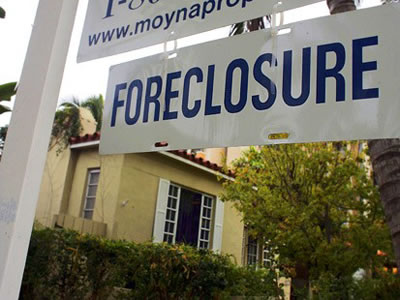The art of mortgage fraud

How do you get official approval of large-scale fraud, theft, and racketeering? You become a mortgage originator (i.e. a “Too-big-To-Fail bank”) like me. No really, it's simple. Let me walk you through the scheme:
First, you wait for the right time. When the Federal Reserve lowers interest rates artificially to a level which encourages rampant “borrowing,” that's a green light (I have placed the term borrowing in quotes because if you research the matter enough, you will discover that you, the bank, have no real money or assets with which to lend, but I digress). Once you entice the “borrower” into your institution, you have them sign an IOU – a promise to pay on a mortgage which is backed by overvalued real-estate. Oh, I forgot to mention. It helps if you pay property appraisers to set a price for this asset which is above true market-value.
Now that you have their note, you're ready to make a real killing by trading this thing up. Stay with me, because this is where it gets really interesting. It's time to “secure” this debt by coming to agreeable terms with securitizers and ratings agencies. Let the raters AAA rate pretty much everything you throw at the securitizers who's job it is to bundle your mortgages into a trust. They can do this without even reviewing the paperwork because, and here is the beautiful part, there is no paperwork.
Why is there no securities paperwork, you ask?
Remember, the trust that underlies a mortgage backed security (MBS) must hold the borrower's note. If the trustee isn't given the note within 90 days after signing, the securities are not legal instruments. They are worthless. Since the loan itself was originated on fraudulent terms (see “low doc”, “no doc”, “liar” and NINJA loans amongst other schemes), the note is per se illegal. All that counts is that we “assign” the deed of trust to whomever “holds” the mortgage to keep the charade going.
Now, no one wants to pay pesky taxes and recording fees for every change of custody the mortgage takes. That wouldn't be a very smart way of maximizing our profits so its better to sell first and just fabricate the docs later. Let's get some background on this last point from L. Randall Wray, Professor of Economics at University of Missouri, a guy who's analyzed the goings on in the securities industry:
“MBSs are typically pooled through a Real Estate Mortgage Investment Conduit (REMIC) that must according to the Internal Revenue Code hold all the paperwork demonstrating a complete chain of title. Done properly, taxes are avoided. Since a number of intermediaries are usually involved from the mortgage originator through to the trustee of the REMIC, there must be endorsements all along the line. However, it now appears that most of the original notes are still held in the loan originator warehouses. There are no endorsements. The trustees do not have the notes.”
I know what you are saying, “we better be careful about the tax fraud we are committing.” Let me tell you, tax fraud is just the beginning of our worries. Once investors and borrowers catch wind of our enterprise, our buddies in DC might have to turn on us for their very survival. It is, however, reassuring to know that the President is going to try his hardest to watch our backs and cover the tracks of our partners in the securities industry by parroting the Financial Markets Association's line that “it would be catastrophic to impose a system-wide moratorium on all foreclosures and such actions could do damage to the housing market and the economy.”
So why do we hold on to the promissory notes while fraudulently assigning the mortgages to a trust? Well, exposing the notes to investor scrutiny would be pretty silly. You don't inform the mark they're being conned. Wray does a great job of explaining how the situation has played out thus far:
“...The tranching process actually prohibited assignment of the notes to the REMICs. Bundles of mortgages of varying quality would be tranched into a variety of securities, say from AAA to BBB. But no individual mortgage is actually assigned to a particular tranche—until it defaults. When one defaults, it is assigned to a lower tranche security and then the foreclosure process begins. This means that from inception of that BBB security, there was no way to assign a note to the trustee because the trustee did not know in advance which mortgage would default. The REMIC trustees tried to get around that by using a dummy conduit called MERS (Mortgage Electronic Registration System) that would “hold” the mortgages and assign them to the proper tranches later. But they do not have the paperwork either, and some courts have rejected their claims as owners.”
Let's just hope borrowers don't start asking for their notes en masse (knock on wood). You see, in our greed and haste we successfully separated the note from the trust deed, leaving trustees with only an “accessory” instrument. If mortgage holders try to foreclose with only the mortgage assignment in their possession, well, in 45 US states they'll be out of luck in a court of law.
I won't tell if you don't.




